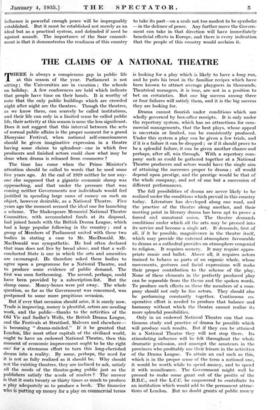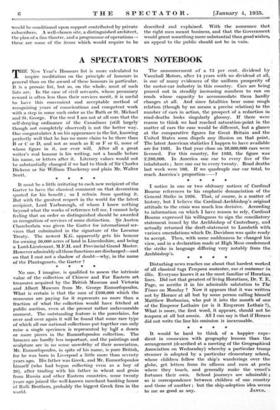THE CLAIMS OF A NATIONAL THEATRE
THERE is always a conspicuous gap in public life 1 at this season of the year. Parliament is not sitting ; the Universities are in vacation ; the schools on holiday. A few conferences are held which indicate that people have time on their hands. It is worthy of note that the only public buildings which are crowded night after night are the theatres. Though the theatres, as we know them, can scarcely be called institutions, and their life can only in a limited sense be called public life, their activity at this season is none the less significant.
Does it not suggest that this interval between the acts of normal public affairs is the proper moment for a grand Dionysiac Festival, when national self-consciousness should be given imaginative expression in a theatre having some claims to splendour—ime in which free producers and finished actors could show what may be done when drama is released from commerce ?
The time has come when the Prime Minister's attention should be called to words that he used some five years ago. At the end of 1929 neither he nor any- one else supposed that a gigantic economic slump was approaching, and that under the pressure that was coining neither Governments nor individuals would feel justified in spending large sums of money on such an object, however desirable, as a National Theatre. Five years ago the moment seemed the ideal one for launching a scheme. The Shakespeare Memorial National Theatre Committee, with accumulated funds at its disposal, had joined hands with the British Drama League, which had a large popular following in the country ; and a grOup of Members of Parliament united with these two bodies in stating a case to Mr. MacDonald. Mr. MacDonald was sympathetic. He had often declared that than does not live by bread alone, and that a well- conducted State is one in which the arts and amenities are encouraged. He therefore asked these bodies to agree upon a programme for a National Theatre, and to produce some evidence of public demand. The first was soon forthcoming. The second, perhaps, could have been provided by' a subscription-list. But the slump came. Money-boxes were put away. The whole question, so far as the Government was concerned, was postponed to some more propitious occasion.
But if ever that occasion should arise, it is surely now.
Trade is improving, money is actors are needing work, and the public—thanks to the activities of the Old Vic and Sadler's Wells, the British Drama League, and the.Festivals at Stratford, Malvern and elsewhere— is becoming " drama-minded." If it be granted that LOndon, like most other capitals of the civilized world, blight to have an endowed National Theatre, then this Moment of economic improvement ought to be the right one for a strenuous effort to turn this long-cherished dream into a reality. By some, perhaps, the need for it is not as fully realized AS it should be. Why should not the existing theatres, they are inclined to ask, satisfy all the needs of the theatre-going public just as the publishers satisfy the needs of readers ? The answer is that it costs twenty or thirty times as much to produce a play adequately as to produce a book. The financier who is putting up money for a play on commercial terms is looking for a play which is likely to have a long run, and he puts his trust in the familiar recipes which have been known to attract average playgoers in thousands. Theatrical managers, it is true, are not in a position to bet on certainties. But one big success among three or four failures will satisfy them, and it is the big success they are looking for.
Drama cannot flourish under conditions which are wholly governed by box-office receipts. It is only under the repertory system, which has no attractions for com- mercial managements, that the best plays, whose appeal is uncertain or limited, can be consistently produced. Under this system a play can be given a few trials, and if it is a failure it can be dropped ; or if it should prove to be a splendid failure, it can be given another chance and perhaps, after all, win through. With a repertory com- pany such as could be gathered together at a National Theatre producers and actors would have the single aim of attaining the successes proper to drama ; all would depend upon prestige, and the prestige would be that of the whole company, and not of one but a succession of different performances.
The full possibilities of drama are never likely to be realized under the conditions which prevail in this country today. Literature has developed along one road, and the practice of the theatre along another, and their meeting point in literary drama has been apt to prove a forced and unnatural union. The theatre demands conditions under which all the arts may be pressed into its service and become a single art. It demands, first of all, if it be possible, magnificence in the theatre itself, which may provide the external atmosphere favourable to drama as a cathedral provides an atmosphere congenial to religion. It requires scenery. It may require appro- priate music and ballet. Above all, it requires actors trained to behave as parts of an organic whole, whose movements, gestures and facial expressions will make their proper contribution to the scheme of the play. None of these elements in the perfectly produced play can be separable from the theme and the spoken words. To produce such effects as these the members of a com- pany should not only be fine actors. They should also be performing constantly together. Continuous co- operative effort is needed to produce that balance and harmony without which the theatre cannot realize its more splendid possibilities.
Only in an endowed National Theatre can that con- tinuous study and practice of drama be possible which will produce such results. But if they can be' attained in a National Theatre they will not stop there. Its stimulating influence will be felt throughout the whole dramatic profession, and- amongst the amateurs in the provinces who profitably use their leisure in the activities of the Drama League. To attain an end such as this, which is in the proper sense of the term a national one, it would be worth while to spend money, and to spend it' with munificance. The Government might well be pressed' to make some grant out of the profits of the B:B.C., and the- L.C.C. be empowered to contribute to an institution 'which would add to the permanent attrac- tions of London. But no doubt grants of public money would be conditional upon support contributed by private subscribers. A well-chosen site, a distinguished architect, the plan of a fine theatre, and a programme of operations— these are some of the items which would require to be described and explained. With the assurance that the right men meant business, and that the Government would grant something more substantial than good wishes, an appeal to the public should not be in vain.







































 Previous page
Previous page